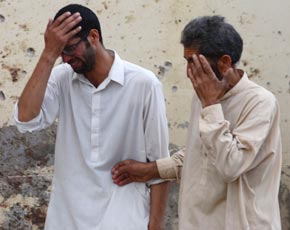Thirty funerals and an Eid – Vaqar Amhed
Today is Eid, and I am dreading the day.
For me it is a day that is dead, empty of meaning, and bereft of joy.
Yesterday, 30 persons were killed in a funeral procession in Quetta. Thirty funerals will take place on Eid day.
Today, people will head to the mosques in their finest clothes. Some of them will come back in shrouds with their heads blown off, limbs severed, and their finest apparels ripped and soaked in blood. Even during the two World Wars, the two sides would hold fire on Christmas Day, but not us good Muslims; when we are on a jihad, we never hold fire.
Under threat of ostracism, I, too, will be forced to go to the mosque and listen to an ignorant man preaching either hatred or inanities. Last year, he ranted against having paintings and photographs hung on walls in the houses. This year, my music collection may be the target of his wrath.
Later, the bell will ring every five minutes. People I don’t know, half know, quarter know, don’t want to know will be turning up. The perfunctory hugging to the beat of one-two-three will be followed by a lifeless handshake and murmured words of felicitation. Some cash will be disbursed to a majority of the visitors.
The day highlights the destruction of all that was good in our country and our faith. How can I celebrate on such a day?
But it was not always like this.
Most of the Eid days during the years of my childhood make for some of my finest memories. We lived in Quetta in the Hazara Shia section of the town. My family is Sunni but the mosque nearest to our house was an Imam Bargah. We could hardly sleep the night before, as the anticipation of Eid day would keep us tossing, turning and dreaming. Getting up with an alacrity that was never there when we had to go to school, we would bathe, put on our new clothes, socks and shoes.
A touch of attar from tiny bottles would complete the preparations for this joyous day, and with the janimaz in hand the whole family would head out for the prayers. The maulana would ask us to join him in asking God for forgiveness, for succour to the suffering, marriage of the unmarried, and of course the liberation of Kashmir. The last mentioned was the only concession made to politics.
Returning home from the prayers we would find our mother and sisters looking beautiful in their new dresses. Hugs would follow: warm, genuine, life giving ones. Relatives would arrive with their children. Their parents lovingly giving us Eidi; small amounts, but enough to trigger complex mathematical calculation on how many of this or that could be bought from the money in hand. Would it be three lollipops, one plastic puzzle and a kaleidoscope? Or, three kites, a kaleidoscope, and a flute? We would race to the little shop down the road and get even more confused when confronted with the dazzling array of colourful treasures on display. The money was small but the happiness immense, untainted by any hint of sadness or tragedy.
My family and I have no new clothes, socks and shoes for today. We can buy a dozen of each if we wish. We have not even cooked any “savaiyaan”. No, we are not of the wahabi ilk, but our spirits are crushed and our are hearts are heavy. No amount of bathing, fresh new clothes and perfume can cleanse us of the invisible stains of shame that we carry on us.
It may be Eid but it is not the same Eid. It may be called Pakistan but it is not Pakistan.
Eid Mubarak to you all. Hope you and your family are still alive tomorrow.
Source :

